The Sub-Program feature enables the selection of specific evaluations for generating various reports. This functionality divides evaluations into distinct segments, enabling tailored reporting. To enable this functionality, the Sub Program Option must be incorporated during form design. When the QA Verifier selects a sub program during evaluation submission, the evaluation is assigned to that subprogram, facilitating report retrieval through subprogram filters.
To access this feature, click on the Menu ![]() button or move the mouse on the left side of the page to open the menu bar as highlighted in the screen below:
button or move the mouse on the left side of the page to open the menu bar as highlighted in the screen below:
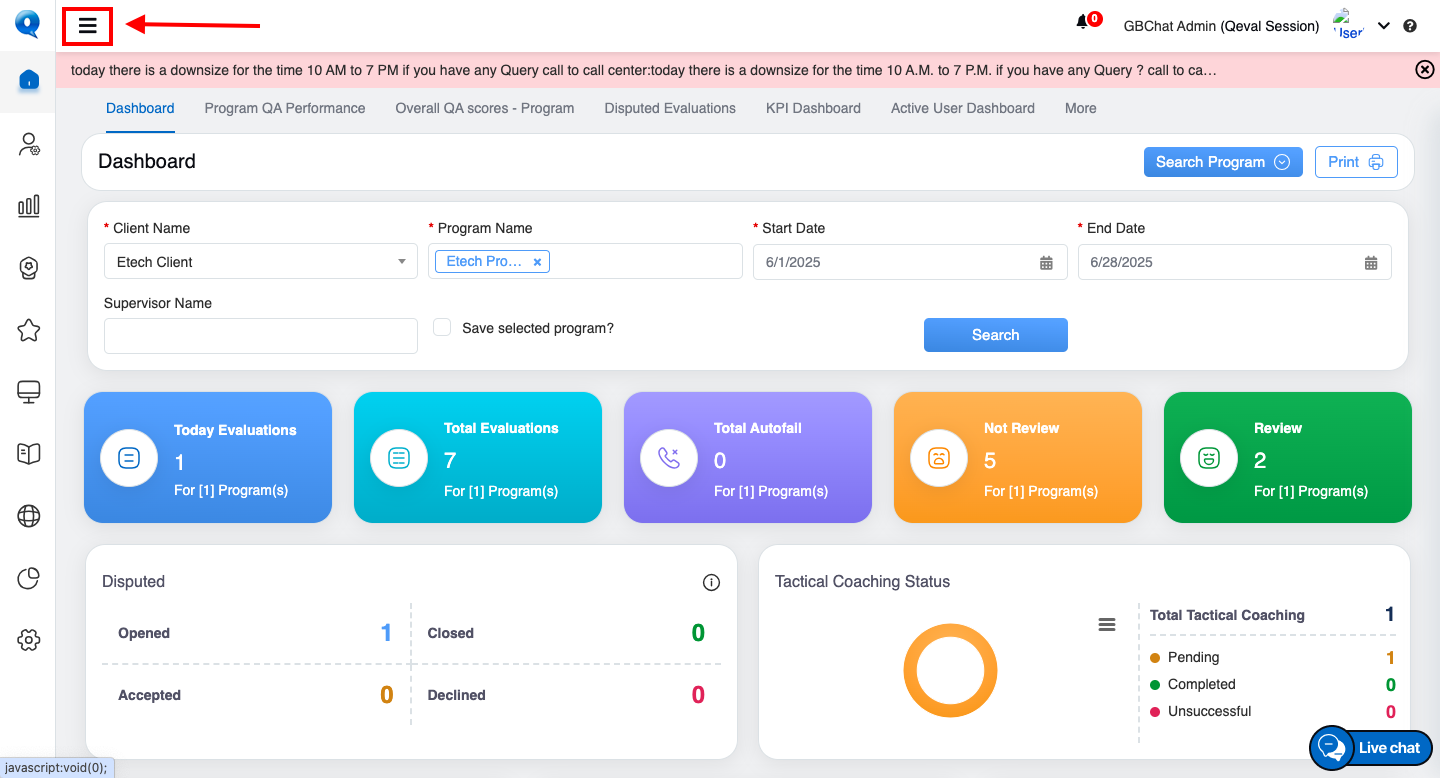
Menu Button opens Menu Bar
On the Menu Bar, click on the Manage ![]() option and then select Program Configuration option as highlighted in the screen below:
option and then select Program Configuration option as highlighted in the screen below:
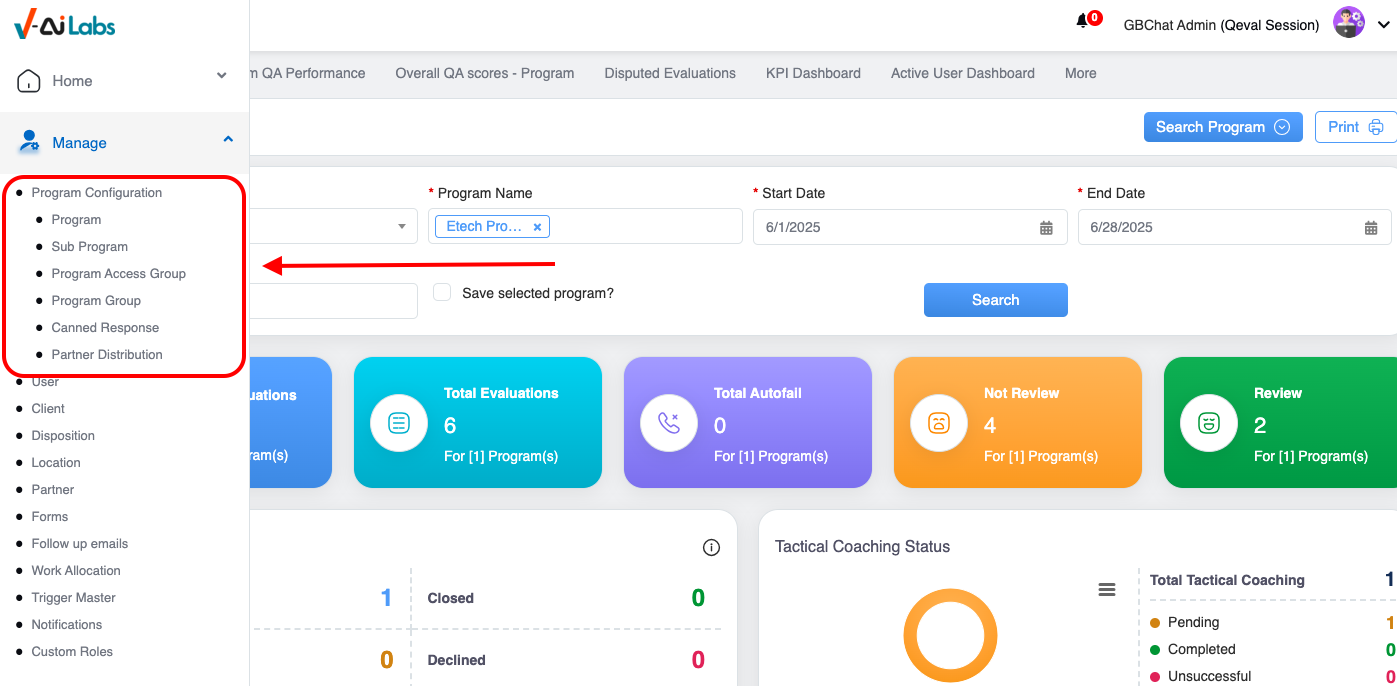
Menu Button opens Menu Bar
Click on the Sub Program option from the list of different features available under the Program Configuration option.The user will be directed to the Manage Sub Program page. This page displays the list of all the sub-programs that are already created for different programs as shown below:

On the Manage Sub Program page, the logged-in user will be able to access the mentioned below functionalities:
Add Sub Program
The authorized user can add sub program for a specific program in QEval system. The page also allows the authorized user to provide certain functionalities for specific or all the sub-programs.
To add the program for a specific location, click on the Add Sub Program button displayed on the Manage Sub Program page as highlighted in the screen below:
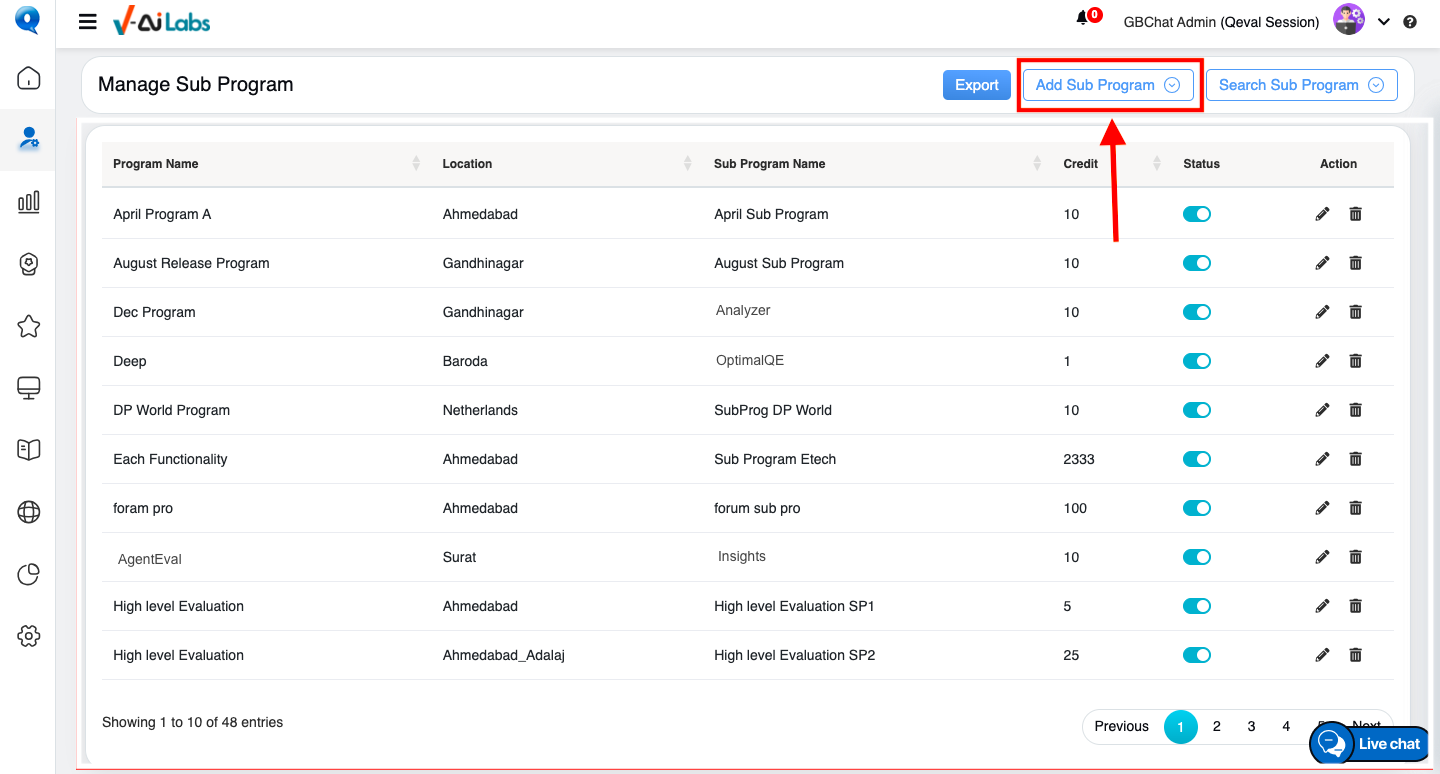
Add Sub Program Button
The Add Sub Program window will be opened on the same page as shown below:
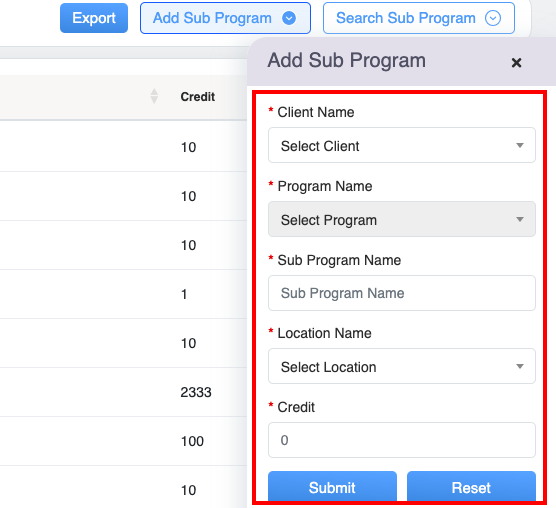
Add Sub Program Button
Provide the following details to add sub program.
- The Client Name drop-down menu displays the list of clients. Select the name of the client from this list.
-
- The Search Bar displayed below the Client Name field, allows the user to search the name of the client by entering keywords in the search textbox.
- The Program Name drop-down menu shows the list of program names based on the selected client name. Select the name of the program from this list.
-
- The Search Bar displayed below the Program Name field, allows the user to search the name of the program by entering keywords in the search textbox.
- Enter the name of the sub program in the textbox displayed under the Sub Program field.
- From the Location Name drop-down menu, the list of locations will be displayed. Select the location for the sub-program. The Search Bar textbox displayed under the Location Name drop-down menu allows the user to search the name of the location by entering keywords in the textbox.
- Enter the credits in the Credit textbox. The user can enter the credit value in dd.dd format only.
Once the necessary fields are configured, click on the Submit button to add the program or click on the Reset button to reset the fields or click on the Cross ![]() button to close the window. An acknowledgment message will be displayed on the same page, and the new sub program will be added.
button to close the window. An acknowledgment message will be displayed on the same page, and the new sub program will be added.
The user will be directed to the Manage Sub Program page and the newly added sub program will be displayed in the table grid and by default the status of the program will be Active:
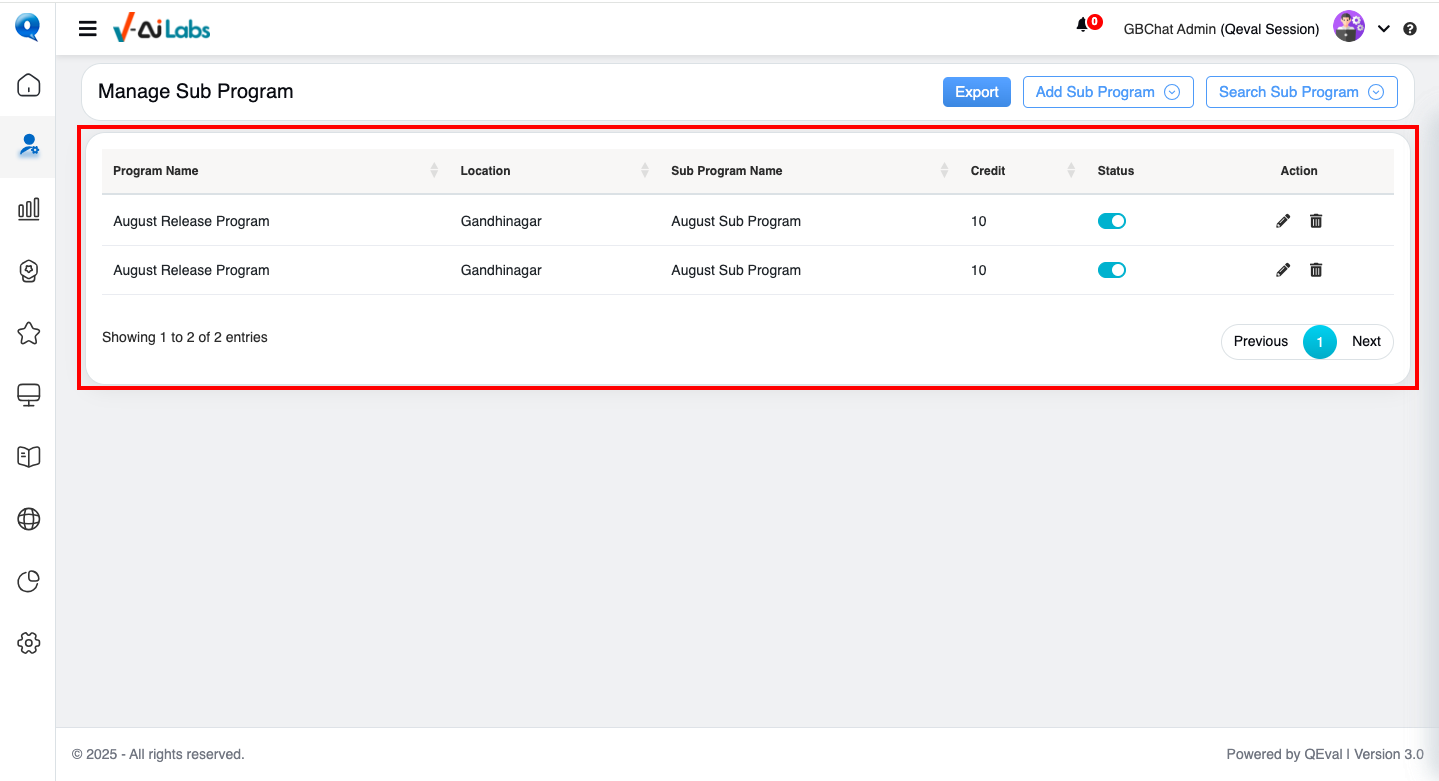
Manage Sub Program Tab
The data elements displayed in the table grid are explained below:
| Table Elements | Description |
| Program Name | Displays the name of the program. |
| Location | Displays the location name. |
| Sub-Program Name | Displays the name of the sub program. |
| Credit | Displays the entered credit for selected sub program. |
| Status |
The status of the sub program whether it is active or inactive is displayed. The toggle button allows users to change the Active sub program to Inactive and vice versa.
(Refer to Search Sub Program to search active or inactive sub-program details) |
| Action |
The Edit The Delete |
How to Add Sub-Program drop-down list in the form?
Once the sub program is added in the system, while designing the form in the “Predefined Section“, the logged-in user needs to add the sub-program option, so that QA Verifier can select the added sub program during evaluation.
Search Sub Program
A Search Sub Program helps the logged-in user to search active or inactive sub programs from the QEval system. The logged-in user has the option to search all the clients for a specific sub program or to search all the sub programs.
To access this functionality, click on the Search Sub Program button available on the Manage Sub Program page as highlighted in the screen below:
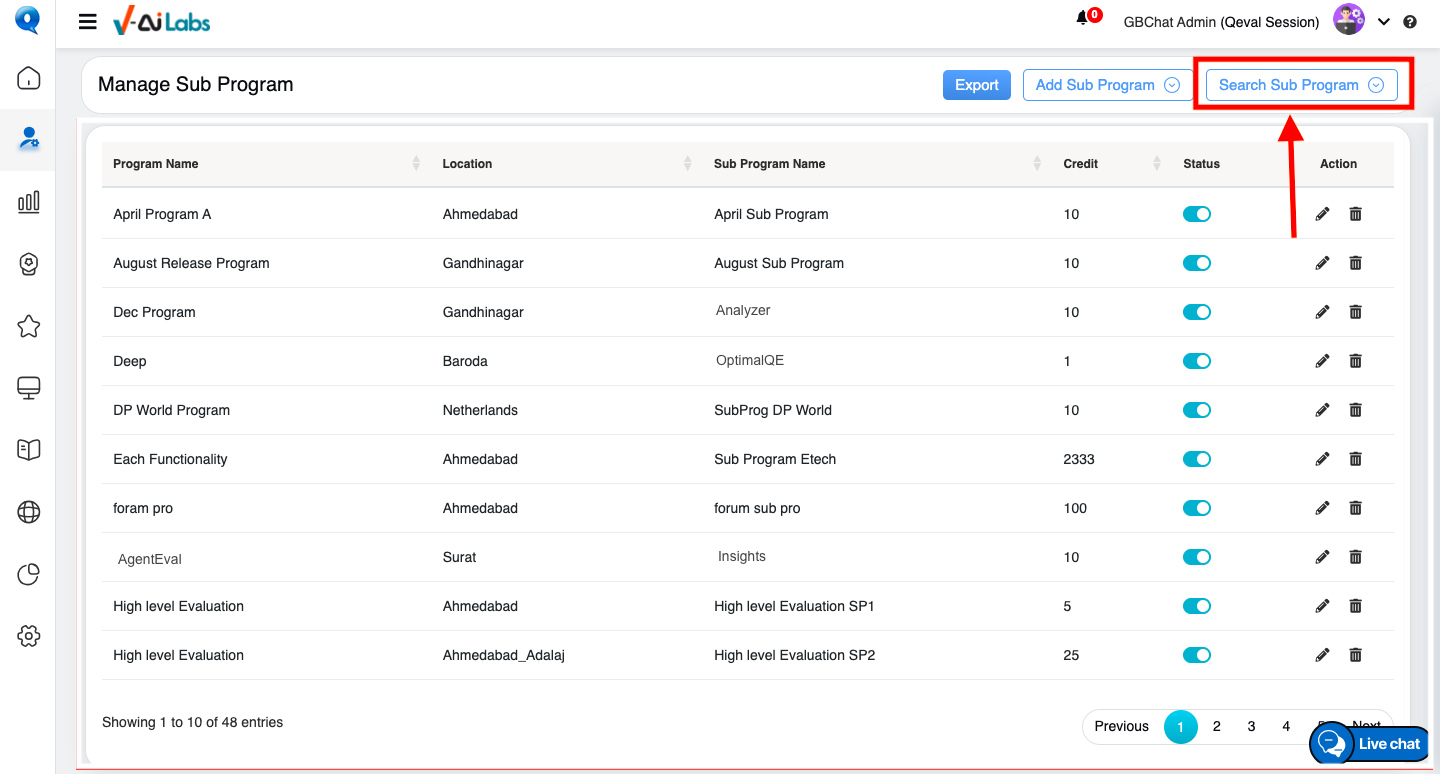
Search Sub Program Button
The Search Sub Program window will be opened on the same page. The window displays the search criteria based on which the logged-in user can search for the specific active or inactive sub program.
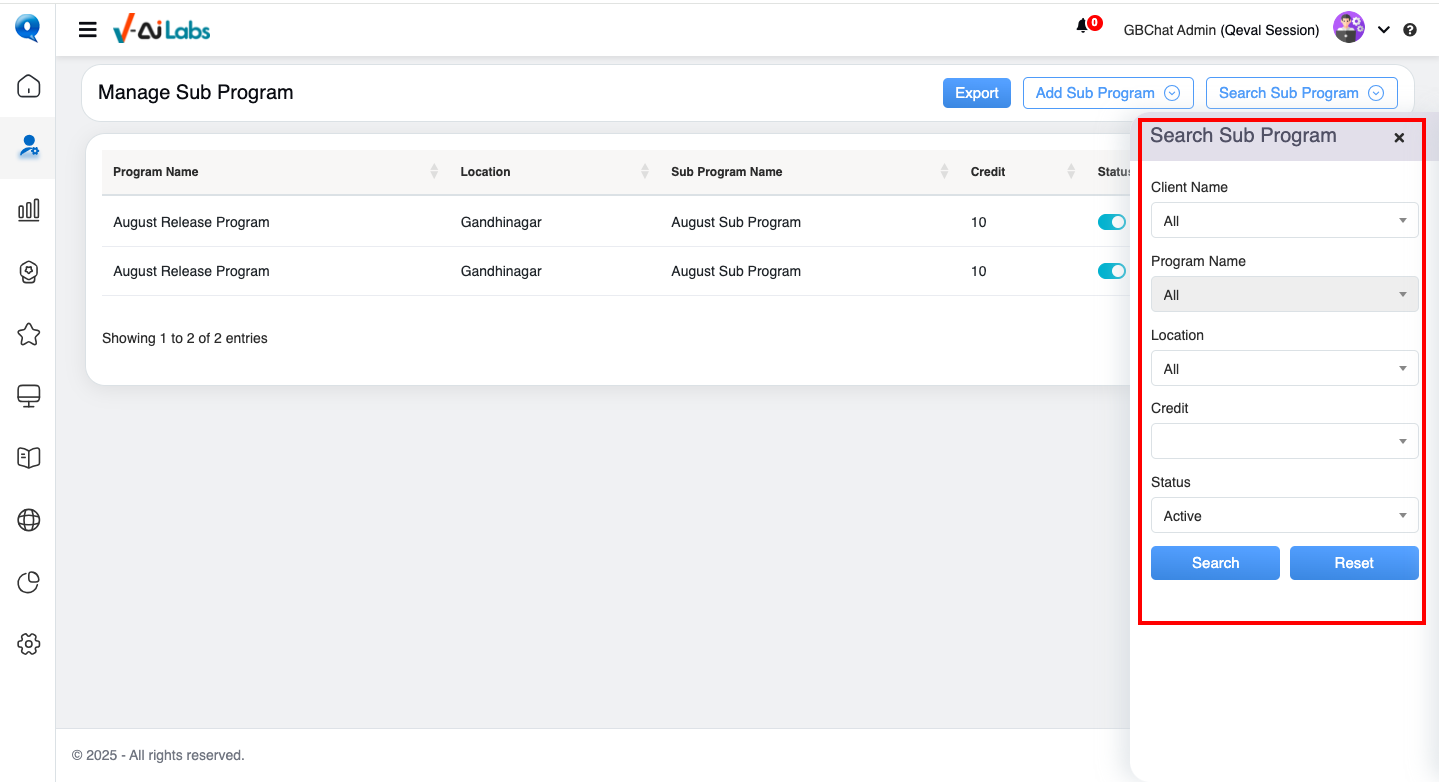
Search Sub Program Tab
The sub program can be searched by following mentioned below steps:
- From the Client Name drop-down menu displays the list of clients. Select the name of the client from the list. One can also search for the name of the client by entering keywords in the Search Bar textbox displayed under the drop-down field.
- From the Program Name drop-down menu displays the list of programs. Select the name of the program from the list. One can also search for the name of the program by entering keywords in the Search Bar textbox displayed under the drop-down field.
- The Location drop-down menu displays the list of location names. Select the location name from the list. One can search location by entering keywords in the Search Bar textbox displayed under the drop-down list.
- From the Credit drop-down menu displays the list of added credits. Select the credit from the list. One can search credit by entering credit number in the Search Bar textbox displayed under the drop-down list.
- To search Active sub programs, click on the Status drop-down menu and then select Active option to search all the active sub programs on the selected criteria.
Once the necessary search filters are configured, click on the Search button to search the active sub programs, or click on the Reset button to reset the search filters or click on the Cross ![]() button to close the window.
button to close the window.
Based on the selected criteria, the search results of Active sub programs will be displayed in the table grid as shown below:

Manage Sub Program Tab
To change the specific sub program status from Active to Inactive, click on the Active ![]() toggle button displayed under the Status column. An acknowledgment message will be displayed, and the selected sub program status will be changed to inactive.
toggle button displayed under the Status column. An acknowledgment message will be displayed, and the selected sub program status will be changed to inactive.
The Inactive sub program can be searched based on selected criteria – Client Name, Program Name, Location, Credit, or combination of any selected criteria, and from Status drop-down menu select the Inactive option. Once the necessary search filters are configured, click on the Search button to search the inactive sub programs, or click on the Rest button to reset the search filters.

Search Sub Program tab
Based on the selected criteria, the search results of Inactive sub programs will be displayed in the table grid as shown below:
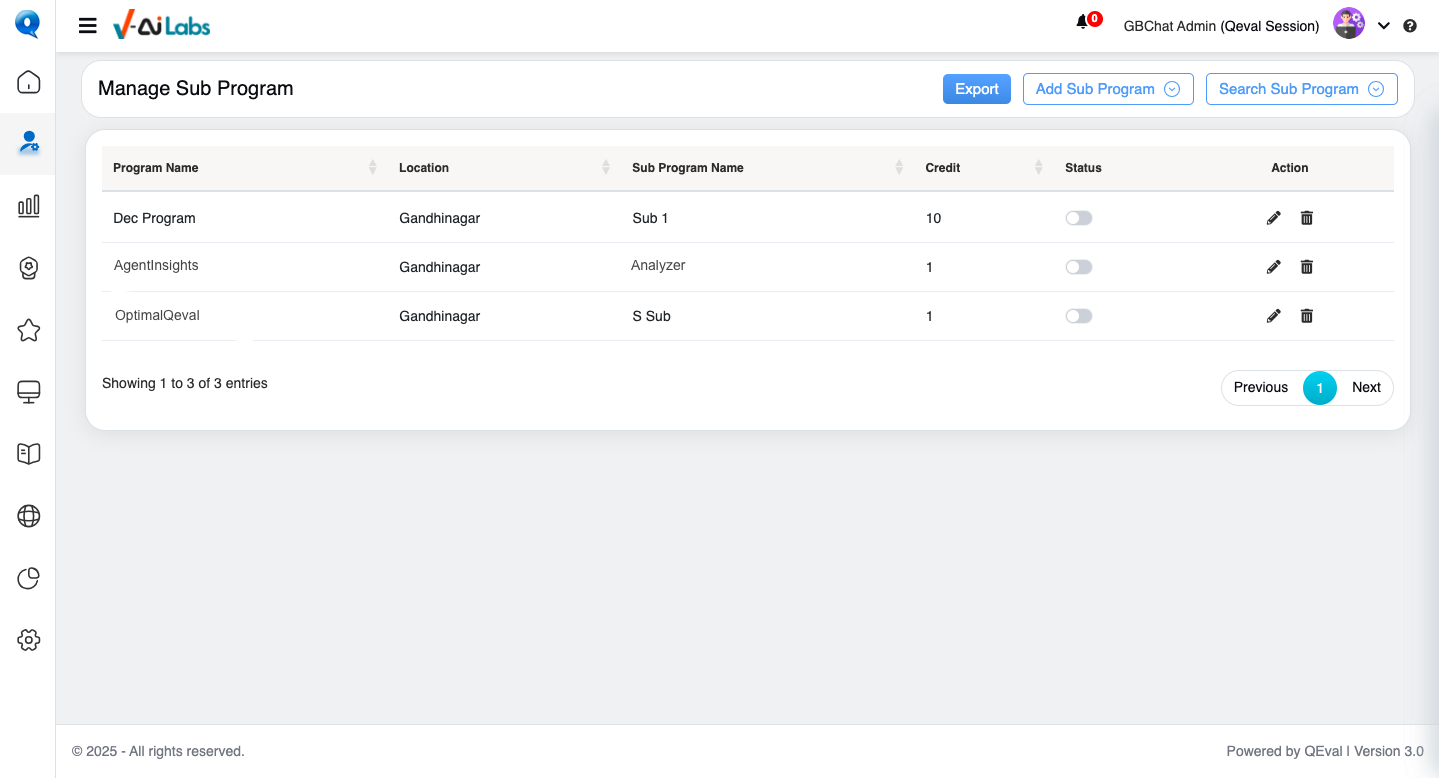
Manage Sub Program tab
To change the specific sub program status from Inactive to Active, click on the Inactive ![]() toggle button displayed under the Status column. An acknowledgment message will be displayed, and the selected sub program status will be changed to active.
toggle button displayed under the Status column. An acknowledgment message will be displayed, and the selected sub program status will be changed to active.
The data elements displayed in the table grid are explained below:
| Table Elements | Description |
| Program Name | Displays the name of the program. |
| Location | Displays the location name. |
| Sub-Program Name | Displays the name of the sub program. |
| Credit | Displays the entered credit for selected sub program. |
| Status |
The status of the sub program whether it is active or inactive is displayed. The toggle button allows users to change the Active sub program to Inactive and vice versa. |
| Action |
The Edit The Delete |
Edit Sub Program
On the Manage Sub Program page, the authorized user can edit the added active or inactive sub program details.
To access this functionality, click on the Edit ![]() button displayed under the Action column as highlighted in the screen below:
button displayed under the Action column as highlighted in the screen below:
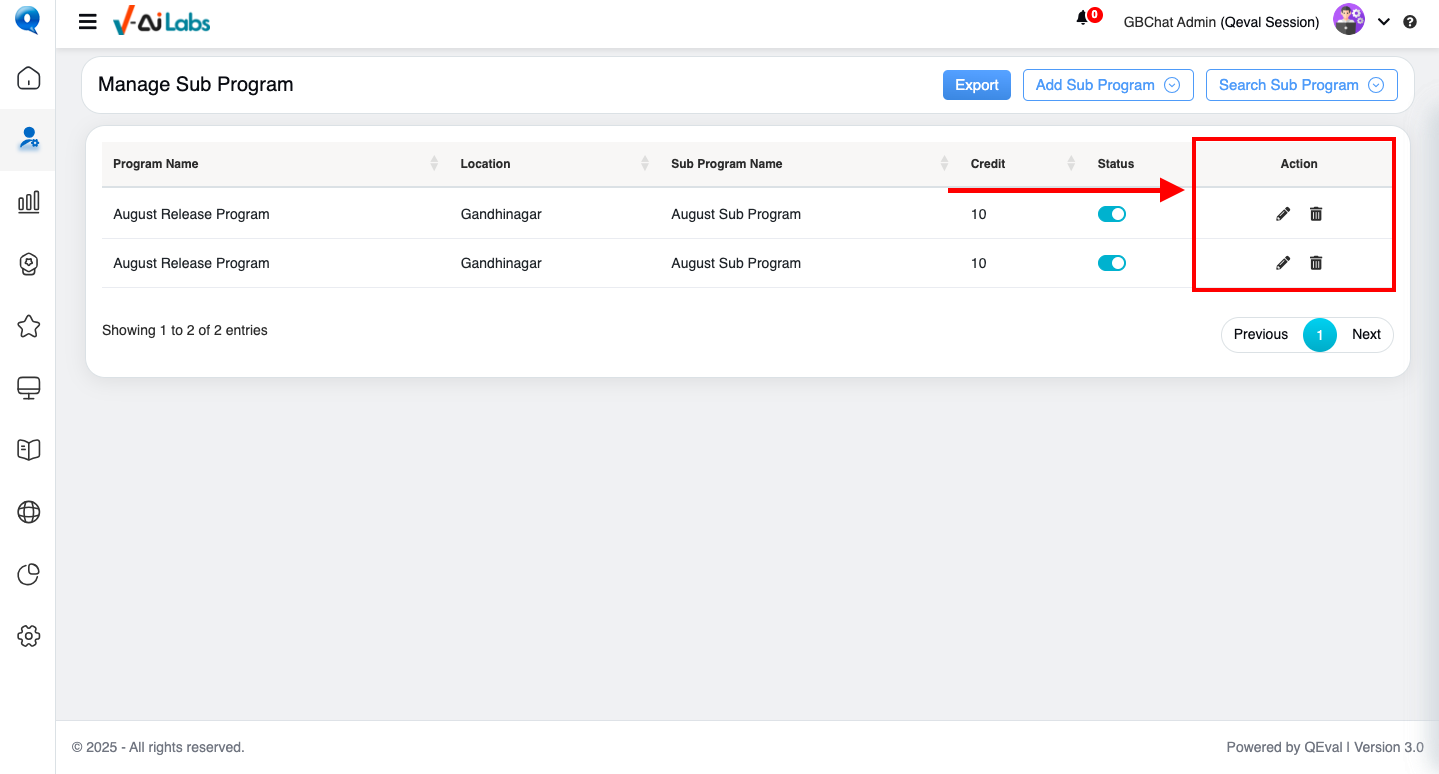
Action Button > Edit Button
Note: Refer to Search Sub Program to search the inactive sub-program details.
The Edit Sub Program window will be opened on the same page.
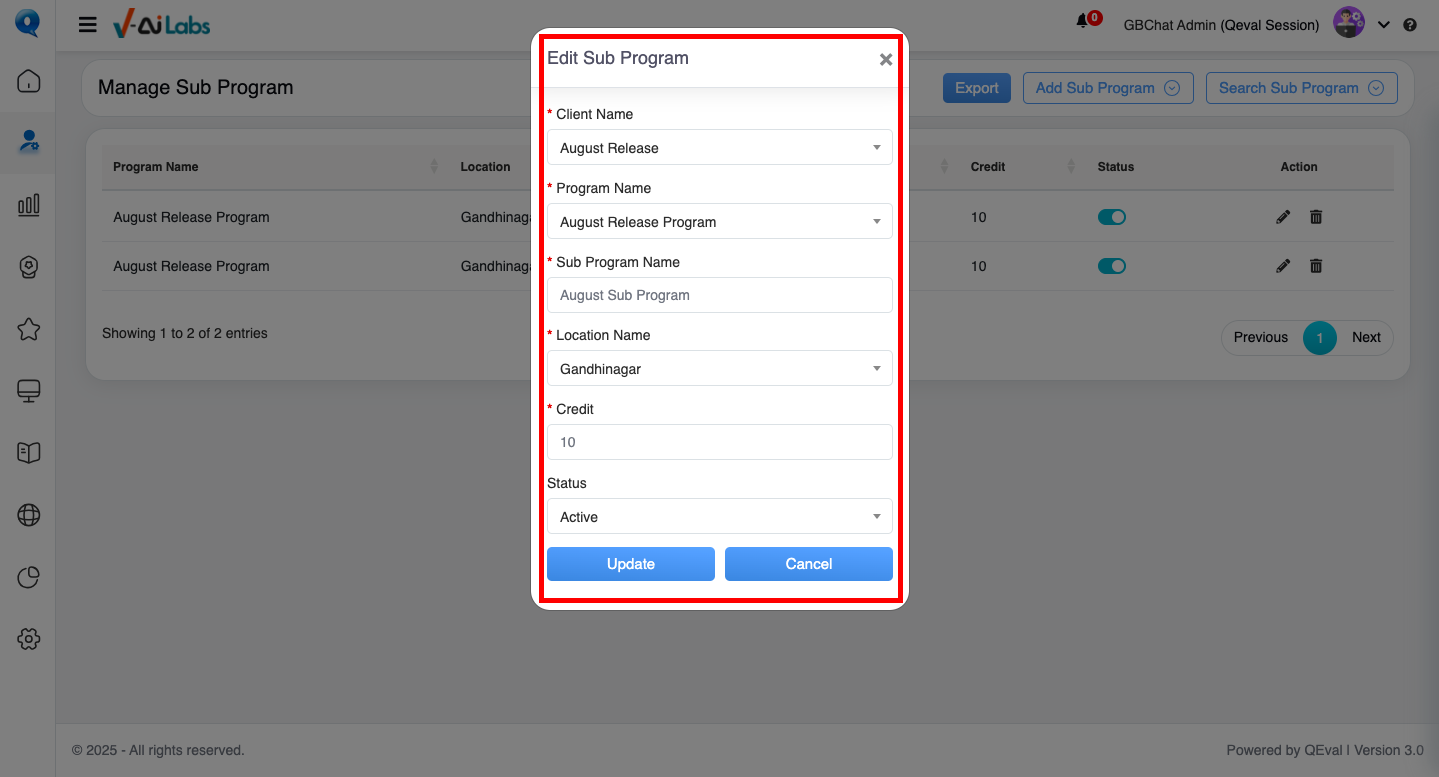
Edit Sub Program tab
Once the necessary modifications are done for specific sub program, click on the Update button to save the changes, or click on the Cancel button to discard the changes. (Refer to Add Sub-Program for adding details). An acknowledgment message will be displayed.
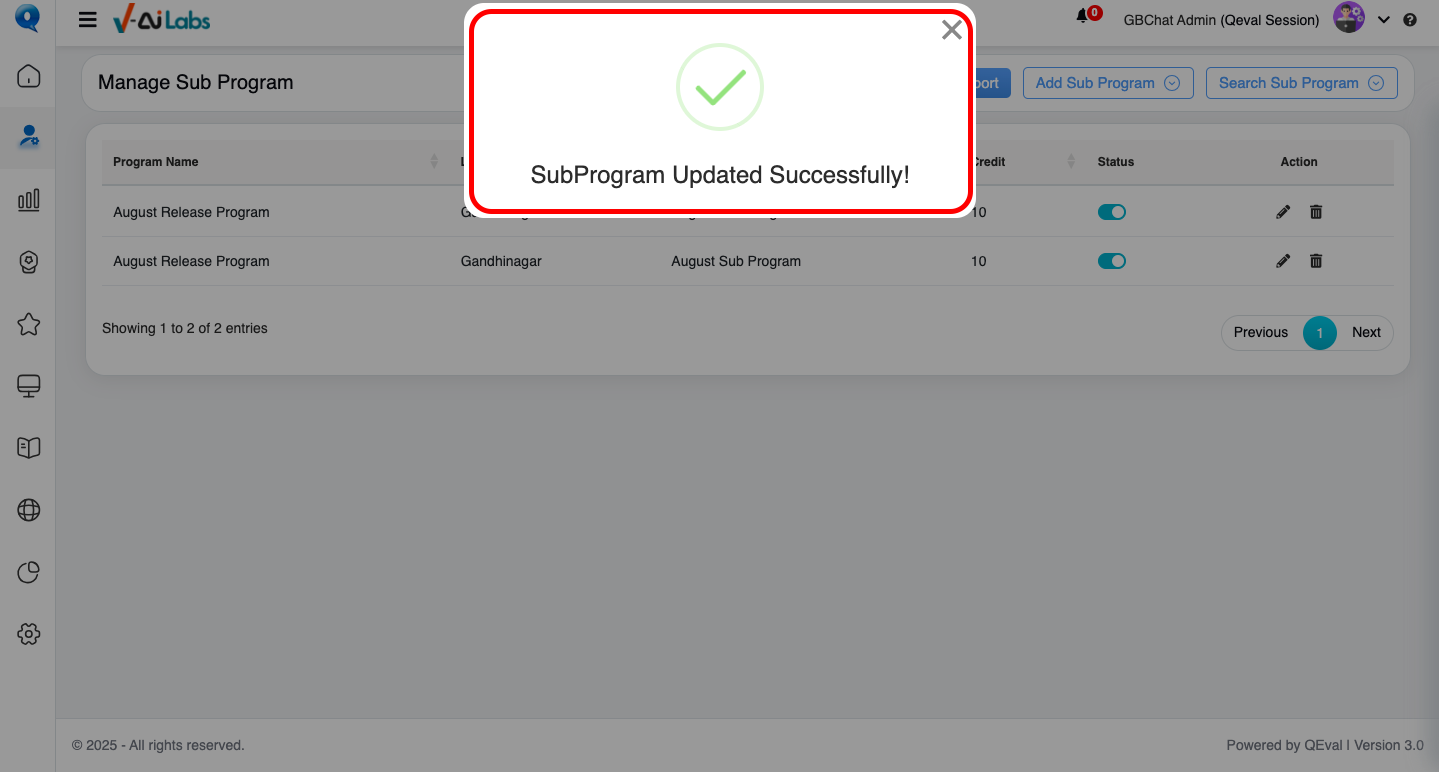
Acknowledgement message
The user will be directed to the Manage Sub Program page and the specific sub program details will be updated and displayed in the table grid.

Manage Sub Program tab
The data elements displayed in the table grid are explained below:
| Table Elements | Description |
| Program Name | Displays the name of the program. |
| Location | Displays the location name. |
| Sub-Program Name | Displays the name of the sub program. |
| Credit | Displays the entered credit for selected sub program. |
| Status |
The status of the sub program whether it is active or inactive is displayed. The toggle button allows users to change the Active sub program to Inactive and vice versa.
(Refer to Search Sub Program to search active or inactive sub-program details) |
| Action |
The Edit The Delete |
Delete Sub Program
On the Manage Sub Program page, the authorized user can delete the sub program details from the QEval system.
To access this functionality, click on the Delete ![]() button displayed under the Action column as highlighted in the screen below:
button displayed under the Action column as highlighted in the screen below:

Action Button > Delete button
A confirmation message will be displayed on the same page. Click on the Yes button to delete the sub program or click on the No button to discard this process.
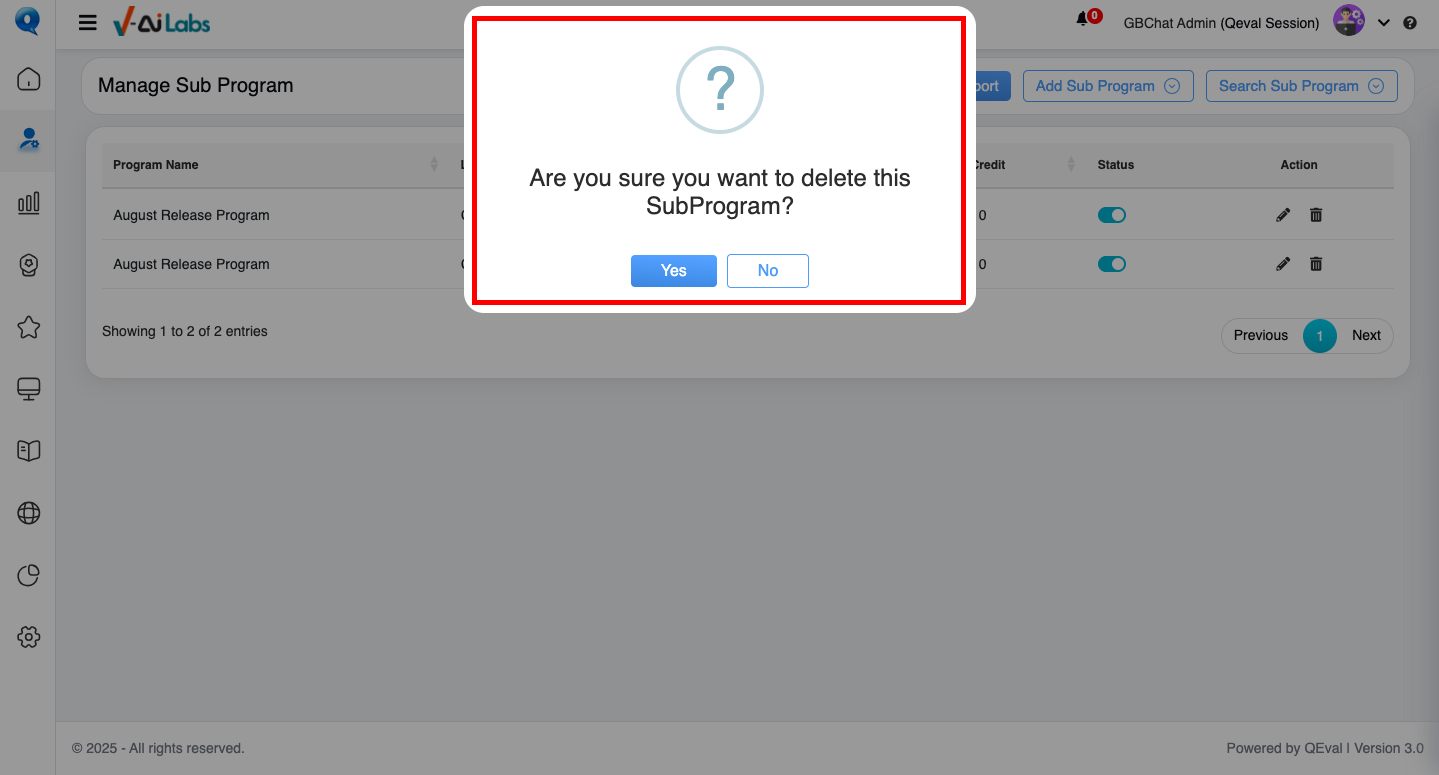
Confirmation Message > Yes Button
Note:
- It is advisable to change the sub program status to “Inactive” rather than opting to delete the program.
- Deleting a program will result in the permanent removal of sub-program details from the QEval system, making it impossible for the user to fetch or recover the deleted sub-program details.
An acknowledgment message will be displayed, and the specific sub program will be permanently deleted from the QEval system.
Export
One can export the sub program details in Excel format. To do so, click on the Export button.

The file will be exported to the local system in the excel format.
Video